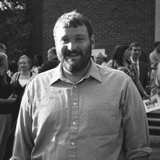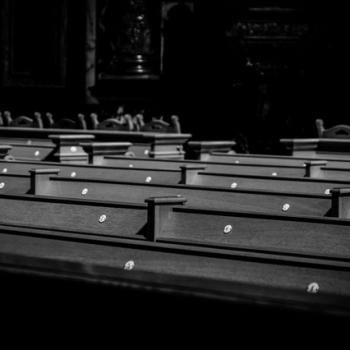 Guest Post by The Rev. Andrew Shepherd
Guest Post by The Rev. Andrew Shepherd
A few weeks ago, I sat at a conference where a young pastor in his first year expressed frustration about his job, and subsequently his calling. I believe his exact words were “What’s the point of church?” That’s a rough place in which to be: working your first call and suddenly having a crisis of faith — not necessarily in God, but in the work you’ve dedicated quite a bit of time (and school) to. My response to this question was something like “our society needs a social fabric…and the church brings people together…and blah blah blah.”
I do believe in that answer (and that might be a post for another day) but not because I think it’s the absolute right answer in all cases. Actually, I think it’s the answer that I come up with when I can’t figure out why the church is worth it. There are those times when it feels like the work I’m doing is a waste of time, that it’s just putting off the death of a dying institution. (Of course, there are also many, many times when the work I’m doing feels like the most important thing I could ever be doing.)
A few of the other participants in our group took a route similar to mine, speaking of the need to determine some kind of “theological grounding,” a reason why the church ought to exist. Before we can start doing ministry, it seems that we first have to come up with some predetermined objective–some reason why we’re doing church.
If I could go back to that moment at that conference, sitting at the table during that small group time, I’d give a completely different answer: I don’t know why we do church. But we do, and we shouldn’t stop.
Fast forward to this morning. Today I sat with a spiritual director, something I’ve been looking forward to for a while. This person, Rene, is trained in directing people on their spiritual journey. We will be meeting once a month together to discuss my own spiritual practices, my discernment in life, my ability to listen to the spirit, etc. This morning, when he asked me why I was seeking spiritual guidance, I started in on describing my scattered feelings, about how I’m beginning discernment on my own ministry and calling, and how my spiritual life feels out of control at times. And then we sat and talked for an hour.
I was expecting him to talk about discipline and practice. Or, I wanted him to talk about discipline and practice. I wanted him to give me a schedule, to assign practices, to keep me accountable. And in some ways he did. I’m supposed to work on daily practice, and keep a journal. But that part of our meeting took about 3 minutes towards the end.
Instead of focusing on the practices I should be doing, Rene pulled the one word he felt was important about what I had said at the beginning of our meeting: control.
I see a dualism to my life: those times when I am ordered and in control, and those times when I am scattered and out of control. In the first of these times, I feel like I am closer to God, that I am more spiritually grounded. In the latter, I feel the opposite, like I lose grip on my own spiritual life, like I have drifted further from God.
His advice to me: accept that even when I’m busy, God is near. And even when it feels as though I’m not giving time to my spiritual life, accept that God loves me. God is not absent in the scattered and out of control parts of my life.
Why does this have anything to do with why the church exists? Because like me waiting for the quiet and controlled times to hear and experience God, I sometimes expect the church to have a clear mission, a clear focus, and a clear reason for existing. I expect it to be ordered. I expect it to be within my control. I build up intricate systems of meaning in my own mind, speak of social fabrics and transformation and encountering the spirit. And the truth is, those things do happen– just not always when we expect. The Holy Spirit doesn’t belong to us, and to place boundaries on how and where God will work in the life of the church attempts to restrict that which will always defy our expectations.
Sometimes the church exists to create a community which reflects the gospel. Sometimes it functions as an agent of social change. Sometimes it exists to challenge people to be more loving. Sometimes it provides a hand to hold during a difficult period in life, or to provide community during stressful times, or to feed the hungry, or to cloth the naked. Sometimes, it even works against its own interest, and in ways counter to its own best self.
But whatever it’s doing, the church exists. And whether we know it or not, whether we can grasp it or not, whether it’s in our control or not, the Spirit is working in the church. Things are growing and changing and happening, things that we’ll probably never be able to control, and that we’ll seldom understand. We might not see it all the time, but I know that the church is growing into something different, something powerful, something meaningful, both because of our work and in spite of it. And, as long as we’re willing to let go of our need to control how that happens, that change and growth might be the best part of working in the church right now.
Rev. Andrew Shepherd is a native of Mesa, Arizona, and a graduate of Northern Arizona University; and Vanderbilt Divinity School in Nashville. He serves as Pastoral Resident at Foothills Christian Church in Phoenix. He liks frisbee, homebrew, and talking to strange people. (True story). If you want to read more, visit his real life blog, Shepshire. (For link–http://shepshire.wordpress.com/












